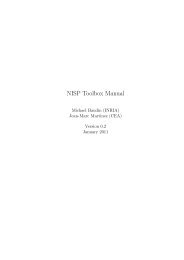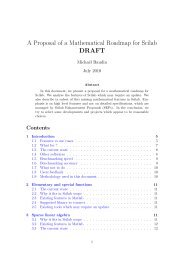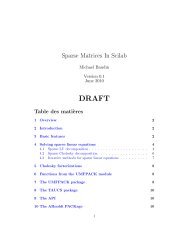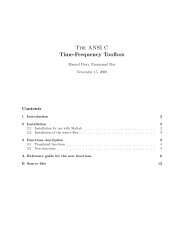Introduction to Sparse Matrices In Scilab - Projects
Introduction to Sparse Matrices In Scilab - Projects
Introduction to Sparse Matrices In Scilab - Projects
You also want an ePaper? Increase the reach of your titles
YUMPU automatically turns print PDFs into web optimized ePapers that Google loves.
int read_sparse ( char * fname , unsigned long fname_len ){SciErr sciErr ;int i,j,k;int * piAddr = NULL ;int iRows = 0;int iCols = 0;int iNbItem = 0;int * piNbItemRow = NULL ;int * piColPos = NULL ;double * pdblReal = NULL ;double * pdblImg = NULL ;CheckRhs (1 ,1);sciErr = getVarAddressFromPosition ( pvApiCtx , 1, & piAddr );if( sciErr . iErr ){printError (& sciErr , 0);return 0;}if( isVarComplex ( pvApiCtx , piAddr )){sciErr = getComplex<strong>Sparse</strong>Matrix ( pvApiCtx ,piAddr , & iRows , & iCols , & iNbItem , & piNbItemRow ,& piColPos , & pdblReal , & pdblImg );}else{sciErr = get<strong>Sparse</strong>Matrix ( pvApiCtx , piAddr ,& iRows , & iCols , & iNbItem ,& piNbItemRow , & piColPos , & pdblReal );}if( sciErr . iErr ){printError (& sciErr , 0);return 0;}sciprint (" <strong>Sparse</strong> %d item (s)\n", iNbItem );k = 0;for (i = 0 ; i < iRows ; i ++){for (j = 0 ; j < piNbItemRow [i] ; j ++){sciprint ("(%d ,%d) = %f",i+1 , piColPos [k], pdblReal [k ]);if( isVarComplex ( pvApiCtx , piAddr ))22
















